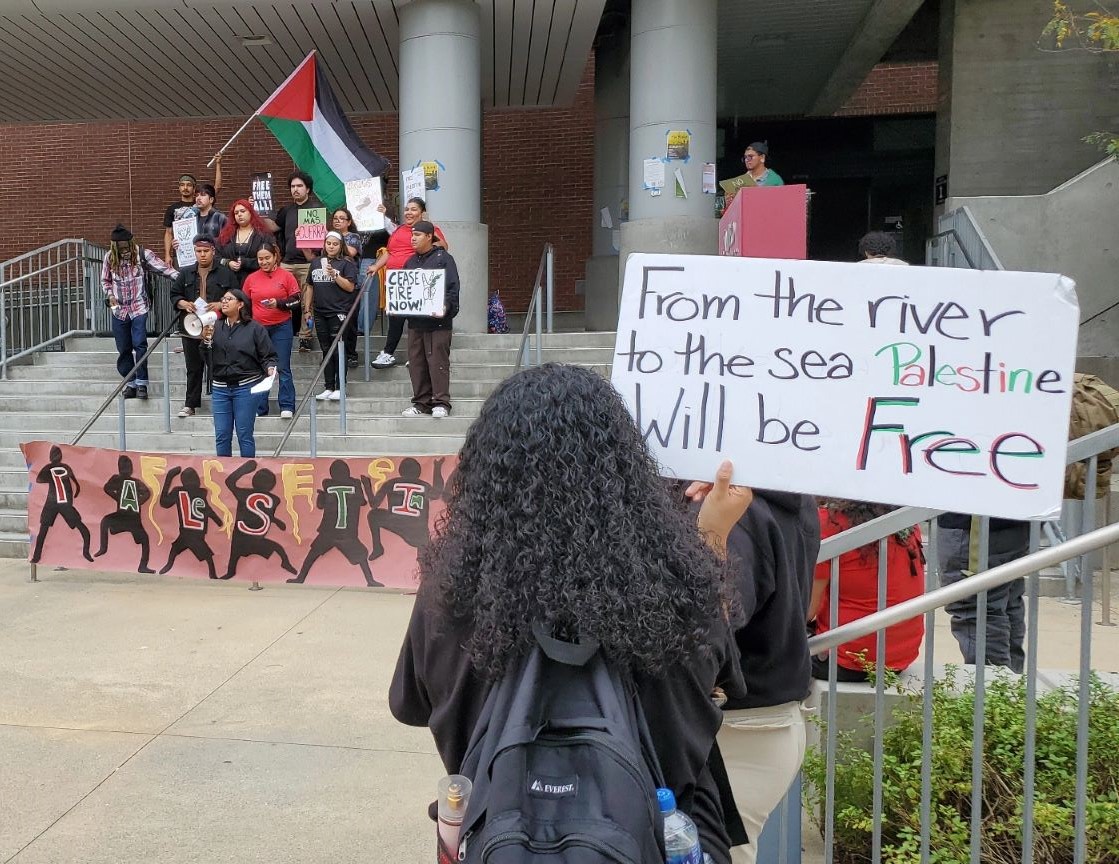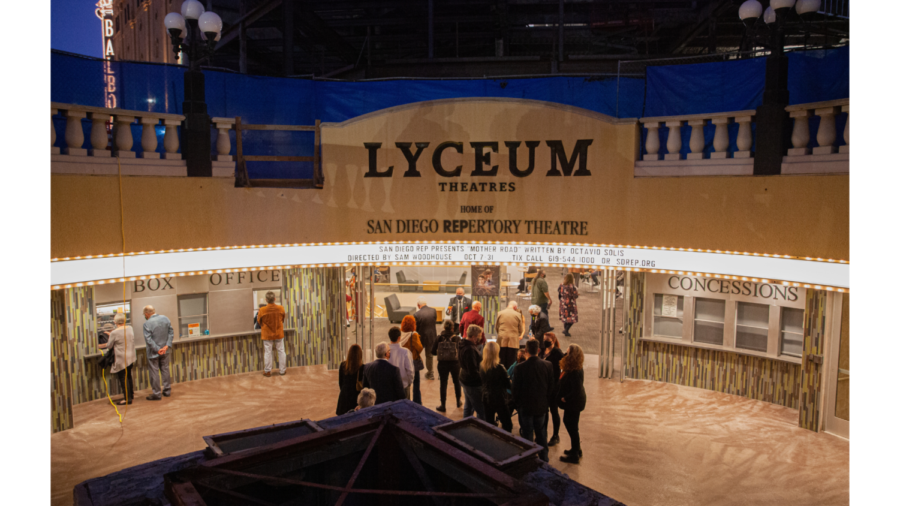With several authorities and scholars on the subject warning of an intentionally unfolding, unequivocally–U.S.-backed genocide in Gaza, presidents of educational institutions across the country are being put in the unenviable predicament of having to either comply with pressure to enforce academic censorship from pro-Israel groups, or be lumped into a concocted public controversy that will falsely label them as enablers of antisemitic expression.
While every single university in Gaza lies destroyed, too many of these administrators have chosen the side of censorship.
Like numerous universities since Oct. 7, most prominently Harvard, MIT and the University of Pennsylvania, the San Diego Community College District was confronted with this challenge.
A Palestine-solidarity teach-in at Mesa College and five public-facing student-created posters at San Diego City College were enough to get the debate started. Administrators and faculty responded to both internal and external backlash from pro-Israel partisans who sought to restrict students and faculty from expressing solidarity with the Palestinian people.
Based on the responses we’ve seen from universities such as Brandeis, Columbia and George Washington University, adequately standing up to politically-motivated pressures for censorship in our academic institutions has been too heavy a task for many administrators to handle.
The SDCCD, San Diego City and Mesa college communities are still debating the extent to which their administrators’ respective interventions violated academic freedom and freedom of speech. What is not up for debate is that there was an intrusion, to whatever degree, into the expression of Palestine solidarity on our campuses.
Whatever their justification or role in this censorship, leaders in educational institutions have missed the mark on refuting the bad-faith accusations head-on that those expressing opposition to Israeli occupation and genocide are inherently antisemitic or, ironically, calling for violence.
An insightful article in Jewish Currents criticized Harvard, New York University and the University of Pennsylvania for establishing advisory groups to combat antisemitism on their campuses without including their most qualified experts on the topic.
Why are academic institutions circumventing their subject matter experts when consulting on topics as important as antisemitism?
Professor of political science at San Diego State University Johnathan Graubart is part of SDSU’s Presidential Task Force on Addressing Antisemitism and says despite a growth of critical scholarship in Jewish studies in the United States, antisemitism initiatives at universities are taking a very narrow, reactionary view of antisemitism.
“It’s not prioritizing people with expertise on antisemitism,” said Graubart. “It’s prioritizing people that are well-accepted by established Jewish organizations like the (Anti-Defamation League) … that are well to the right (politically) of the American Jewish community at large and well to the right of (college-aged) Jewish students.”
Graubart, who specializes in the areas of international law, Zionism and Jewish dissent, recalls that SDSU’s own task force was initially mandated by the university’s president in 2021 to include one representative from three different Jewish organizations, including the ADL.
According to Graubart, a bid was recently made within the task force to add a second ADL representative and it now has a representative from the American Jewish Committee, which holds the same perspective as the ADL.
He says he’s currently the only dissenting voice against the argument that conflates criticisms of Israel with antisemitism.
“The impetus for them setting up these antisemitism task forces is not simply to understand current antisemitism,” he said, “It’s to satisfy pressure from established American Jewish organizations and particularly from the wealthiest Jewish donors.”
It is said the first casualty in war is truth. The disingenuous gaslighting of and coordinated attacks against Palestine-solidarity advocates come from the well-documented propaganda strategy of a country that’s been in a permanent state of war and colonial expansion since its inception.
Absent in too many conversations combating this deceptive narrative that paints Jewish identity as a monolith of support for Israel and Zionism are the positions taken by a wide range of Jewish and Israeli groups, who reject the overarching weaponization of Jewish suffering for Israel’s goals.
Graubart says the conflation narrative collapses all criticism of Israel together and hurts the cause of combating antisemitism because it makes it difficult to distinguish its actual manifestations.
“They’ve stopped even trying to make some distinction, like they’re not looking for, say, Nazi swastikas or something,” Graubart said. “(The ADL has) taken to categorizing, pretty much, let’s just say most, if not all, protests … as instances of antisemitism on college campuses.”
If the basic logic that criticizing a country’s government for its harmful policies isn’t homologous with hating an entire people or religion isn’t enough, one needs only listen to the systematic dismantling of the Zionist conflation argument by such prominent American Rabbis as Yaakov Shapiro, Dovid Felman, Shaul Magid or Yisroel Dovid Weiss to understand the deeply-rooted nature of the rejection of Israeli misappropriation of Jewish identity.
Filmed testimonies like in “Israelism” and “Breaking the Silence” also illustrate how some Israelis and American Jews reject Israeli policies and express solidarity with Palestinian liberation.
In a telling example of the diversity of Jewish attitudes toward Israel, the website Jewish Telegraph Agency published an article on the findings of an insightful 2021 survey by the Jewish Electorate Institute.
The study showed 34% of respondents agreed that “Israel’s treatment of Palestinians is similar to racism in the United States.” As of 2021, 25% agreed that “Israel is an apartheid state” and 22% agreed that “Israel is committing genocide against the Palestinians.”
More important than the numbers, the arguments themselves made by Jewish and Israeli scholars tell a poignant story for university administrators to consider.
These arguments have been laid out collectively in a string of scathing statements by Jewish and Israeli experts who both reject the antisemitic conflation argument and attack Israel for its inhumane policies toward Palestinians.
The Jerusalem Declaration on Antisemitism, which Graubart signed, was endorsed by over 350 scholars in the fields of Holocaust history, Jewish studies, and Middle East studies.
This indispensable declaration, which provides an outline it claims will help strengthen the fight against antisemitism, states that “criticizing or opposing Zionism as a form of nationalism, or arguing for a variety of constitutional arrangements for Jews and Palestinians in the area between the Jordan River and the Mediterranean,” does not constitute antisemitism on its face.
Another prescient Jewish-Israeli-initiated document from August 2023 titled “The Elephant in the Room” includes charges against Israel that refer to its “illegal occupation,” “ethnic cleansing,” “apartheid” and “Jewish supremacism” over the Palestinians. Over 2,400 scholars in Jewish-Israeli related fields signed on.
Over 200 scholars in Jewish Studies and Israel Studies also endorsed the May 2021 “Statement on Israel/Palestine by Scholars of Jewish Studies and Israel Studies,” which included a concise analysis of the effects that Zionist policies have imposed upon Palestinians.
The experts acknowledged that Zionism represents a diverse set of linked ethno-nationalist ideologies, “shaped by settler colonial paradigms (which have) also contributed to unjust, enduring, and unsustainable systems of Jewish supremacy, ethnonational segregation, discrimination, and violence against Palestinians that have been forcefully condemned, including by Jews, Israeli citizens, and Israeli human rights groups.”
College leaders, especially ones that highlight decolonization in their policies like SDCCD, should be able to differentiate between protecting vulnerable groups and being deceived into serving the interests of an ethno-nationalist ideology.
Social justice-oriented administrators need to consider the outright political make-up of these groups before considering the censorship attempts of the pro-Israel crowd.
With the upcoming City College Academic Senate resolution that seeks to serve as a safeguard by reaffirming the SDCCD’s policy of academic freedom and free speech, district administrators and faculty could strengthen their resolve by researching and understanding what constitutes actual antisemitism while supporting legitimate free speech and academic freedom on their campuses, because at least they still have campuses.
Clarification, Tuesday, Mar. 5, 7:35 p.m.: This story was updated to specify that SDSU’s Presidential Task Force on Addressing Antisemitism was initially mandated by the university’s president in 2021 to include one representative from three different Jewish organizations, including the ADL. According to Graubart, a bid was recently made within the task force to add a second ADL representative and it now has a representative from the American Jewish Committee, which holds the same perspective as the ADL.









Ivan • Mar 1, 2024 at 9:54 am
Thank you for this opinion piece. It is much needed at a time when when propaganda tries to blur the distinction between critcizing Zionist Israel for committing genocide with racism. It is NOT anti-Semitic to criticize Zionist Israel for its treatment of Palestinians the same way it is not anti-Caucasian for criticizing Nazi Germany for its treatment of Jews and Russians.